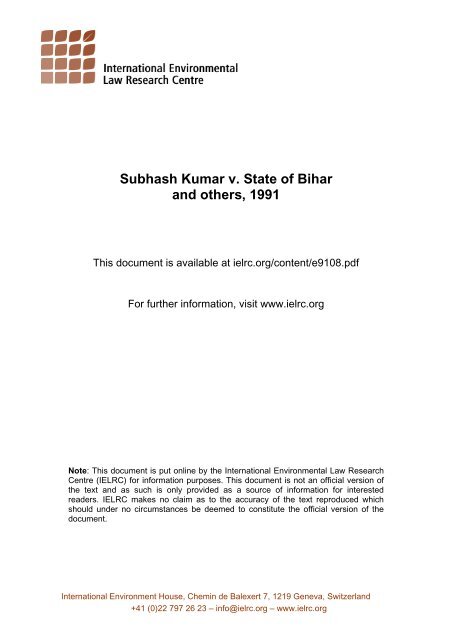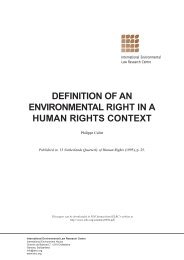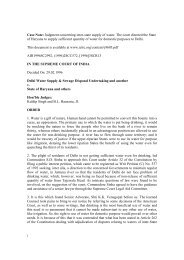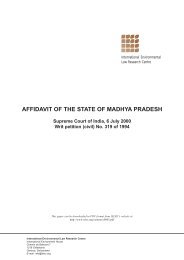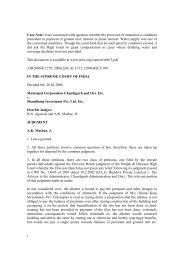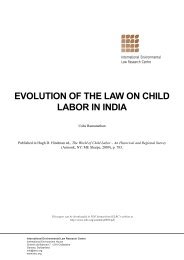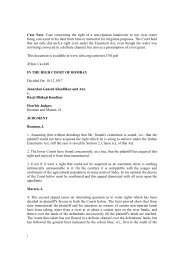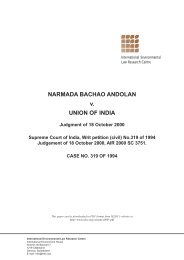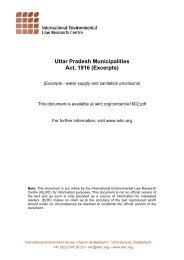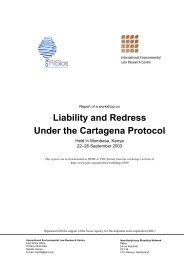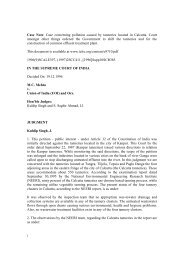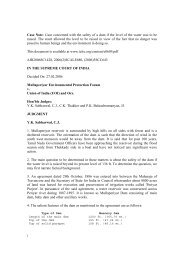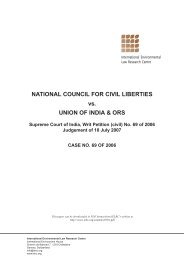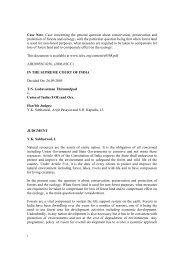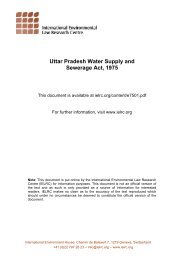Subhash Kumar v. State of Bihar and others, 1991 - International ...
Subhash Kumar v. State of Bihar and others, 1991 - International ...
Subhash Kumar v. State of Bihar and others, 1991 - International ...
You also want an ePaper? Increase the reach of your titles
YUMPU automatically turns print PDFs into web optimized ePapers that Google loves.
<strong>Subhash</strong> <strong>Kumar</strong> v. <strong>State</strong> <strong>of</strong> <strong>Bihar</strong><br />
<strong>and</strong> <strong>others</strong>, <strong>1991</strong><br />
This document is available at ielrc.org/content/e9108.pdf<br />
For further information, visit www.ielrc.org<br />
Note: This document is put online by the <strong>International</strong> Environmental Law Research<br />
Centre (IELRC) for information purposes. This document is not an <strong>of</strong>ficial version <strong>of</strong><br />
the text <strong>and</strong> as such is only provided as a source <strong>of</strong> information for interested<br />
readers. IELRC makes no claim as to the accuracy <strong>of</strong> the text reproduced which<br />
should under no circumstances be deemed to constitute the <strong>of</strong>ficial version <strong>of</strong> the<br />
document.<br />
<strong>International</strong> Environment House, Chemin de Balexert 7, 1219 Geneva, Switzerl<strong>and</strong><br />
+41 (0)22 797 26 23 – info@ielrc.org – www.ielrc.org
Case Note: Case concerning alleged pollution <strong>of</strong> the river Bokaro River by the release <strong>of</strong><br />
slurry/sludge into it by an industrial unit located on it’s banks. The Court opined that<br />
though the right to life guaranteed under Article 21 <strong>of</strong> the Constitution includes the right<br />
to enjoyment <strong>of</strong> pollution free water <strong>and</strong> that a citizen had recourse to Article 32 <strong>of</strong> the<br />
Constitution for removal <strong>of</strong> pollution from water, in the present case adequate steps had<br />
been taken by the <strong>State</strong> Pollution Control Board <strong>and</strong> the industry concerned to prevent<br />
pollution. Although the petitioner had approached the Court through a public interest<br />
Litigation, it was his private interests <strong>and</strong> grudges that he sought to fulfill. The Court held<br />
that this could not be permitted as it would amount to an abuse <strong>of</strong> the process <strong>of</strong> the<br />
Court.<br />
AIR <strong>1991</strong> SC 420<br />
IN THE SUPREME COURT OF INDIA<br />
Decided on: 1/09/<strong>1991</strong><br />
<strong>Subhash</strong> <strong>Kumar</strong><br />
v.<br />
<strong>State</strong> <strong>of</strong> <strong>Bihar</strong> <strong>and</strong> <strong>others</strong><br />
Hon’ble Judges:<br />
K. N. Singh, N. D. Ojha JJ<br />
Judgement<br />
SINGH, J.<br />
1.We heard the arguments in detail on 13-12-1990 <strong>and</strong> dismissed the petition with costs<br />
amounting to Rs. 5,000/- with the direction that the reasons shall be delivered later on.<br />
We are, accordingly, delivering our reasons.<br />
2. This petition is under Art. 32 <strong>of</strong> the Constitution by <strong>Subhash</strong> <strong>Kumar</strong> for the issue <strong>of</strong> a<br />
writ or direction directing the Director <strong>of</strong> Collieries, West Bokaro Collieries at<br />
Ghatot<strong>and</strong>, District Hazaribagh in the <strong>State</strong> <strong>of</strong> <strong>Bihar</strong> <strong>and</strong> the Tata Iron & Steel Co. Ltd. to<br />
stop forthwith discharge <strong>of</strong> slurry/sludge from its washeries at Ghatot<strong>and</strong> in the District<br />
<strong>of</strong> Hazaribagh into Bokaro river. This petition is by way <strong>of</strong> public interest litigation for<br />
preventing the pollution <strong>of</strong> the Bokaro river water from the sludge/ slurry discharged<br />
from the washeries <strong>of</strong> the Tata Iron & Steel Co. Ltd. The petitioner has alleged that the<br />
Parliament has enacted the Water (Prevention <strong>and</strong> Control <strong>of</strong> Pollution) Act, 1978<br />
(hereinafter referred to as the Act') providing for the prevention <strong>and</strong> control <strong>of</strong> water<br />
pollution <strong>and</strong> the maintaining or restoring <strong>of</strong> wholesomeness <strong>of</strong> water, for the<br />
establishment <strong>of</strong> Board for the prevention <strong>and</strong> control <strong>of</strong> water pollution. Under the<br />
provisions <strong>of</strong> the Act the <strong>State</strong> Pollution Control Board constituted to carry out functions<br />
prescribed under S. 17 <strong>of</strong> the Act which among other things provide that the Board shall<br />
inspect sewage or trade effluents <strong>and</strong> plants for the treatment <strong>of</strong> sewage <strong>and</strong> trade<br />
effluents <strong>and</strong> to review plans, specifications or other data set up for the treatment <strong>of</strong> water<br />
1
<strong>and</strong> to lay down st<strong>and</strong>ards to be complied with by the persons while causing discharge <strong>of</strong><br />
sewage or sullage. Section 24 <strong>of</strong> the Act provides that no person shall knowingly cause or<br />
permit any poisonous, noxious or polluting matter to enter into any stream or well which<br />
may lead to a substantial aggravation <strong>of</strong> pollution. The petitioner has asserted that Tata<br />
Iron <strong>and</strong> Steel Co., respondent No. 5 carries on mining operation in coal mines/ washeries<br />
in the town <strong>of</strong> Jamshedpur. These Coal Mines <strong>and</strong> Collieries are known as West Bokaro<br />
Collieries <strong>and</strong> the Collieries has two Coal Washeries where the coal after its extraction<br />
from the mines is brought <strong>and</strong> broken into graded pieces <strong>and</strong> thereafter it is processed for<br />
the purpose <strong>of</strong> reducing its ash contents. A chemical process is carried out. which is<br />
known as 'froth floatation process'. Under this process the graded coal is mixed with<br />
diesel oil, pine oil <strong>and</strong> many other chemical ingredients <strong>and</strong> thereafter it is washed with<br />
the lacs <strong>of</strong> gallons <strong>of</strong> water. The end water is washed coal with reduced quantity <strong>of</strong> ash<br />
content fit for high graded metallurgical process for the purposes <strong>of</strong> manufacture <strong>of</strong> steel.<br />
In the process <strong>of</strong> washing large quantity <strong>of</strong> water is discharged through pipes which carry<br />
the discharged water to storage ponds constructed for the purpose <strong>of</strong> retaining the slurry.<br />
Along with the discharged water, small particles <strong>of</strong> coal are carried away to the pond<br />
where the coal particles settle down on the surface <strong>of</strong> the pond, <strong>and</strong> the same is collected<br />
after the pond is de-watered. The coal particles which are carried away by the water is<br />
called the slurry which is ash free, it contains fine quality <strong>of</strong> coal which is used as fuel.<br />
3. The petitioner has alleged that the surplus waste in the form <strong>of</strong> sludge/ slurry is<br />
discharged as an effluent from the washeries into the Bokaro river which gets deposited<br />
in the bed <strong>of</strong> the river <strong>and</strong> it also gets settled on l<strong>and</strong> including the petitioner's l<strong>and</strong><br />
bearing Plot No. 170. He has further alleged that the sludge or slurry which gets<br />
deposited on the agricultural l<strong>and</strong> is absorbed by the l<strong>and</strong> leaving on the top a fine<br />
carboniferous product or film on the soil, which adversely affects the fertility <strong>of</strong> the l<strong>and</strong>.<br />
The petitioner has further alleged that the effluent in the shape <strong>of</strong> slurry is flown into the<br />
Bokaro river which is carried out by the river water to the distant places polluting the<br />
river water as a result <strong>of</strong> which the river water is not fit for drinking purposes nor it is fit<br />
for irrigation purposes. The continuous discharge <strong>of</strong> slurry in heavy quantity by the Tata<br />
Iron & Steel Co. from its washeries posing risks to the health <strong>of</strong> people living in the<br />
surrounding areas <strong>and</strong> as a result <strong>of</strong> such discharge the problem <strong>of</strong> pure drinking water<br />
has become acute. The petitioner has asserted that in spite <strong>of</strong> several representations, the<br />
<strong>State</strong> <strong>of</strong> <strong>Bihar</strong> <strong>and</strong> <strong>State</strong> Pollution Control Board have failed to take any action against the<br />
Company instead they have permitted the pollution <strong>of</strong> the river water. He has further<br />
averted that the <strong>State</strong> <strong>of</strong> <strong>Bihar</strong> instead <strong>of</strong> taking any action against the Company has been<br />
granting leases on payment <strong>of</strong> royalty to various persons for the collection <strong>of</strong> slurry. He<br />
has, accordingly, claimed relief for issue <strong>of</strong> direction directing the respondents which<br />
include the <strong>State</strong> <strong>of</strong> <strong>Bihar</strong>, the <strong>Bihar</strong> Pollution Control Board, Union <strong>of</strong> India <strong>and</strong> Tata<br />
Iron & Steel Co., to take immediate steps prohibiting the polution <strong>of</strong> the Bokaro river<br />
water from the discharge <strong>of</strong> slurry into the Bokaro river <strong>and</strong> to take further action under<br />
provisions <strong>of</strong> the Act against the Tata Iron & Steel Co.<br />
4. The respondents have contested the petition <strong>and</strong> counter-affidavits have been filed on<br />
behalf <strong>of</strong> the respondents Nos. 2, 4 <strong>and</strong> 5 - <strong>State</strong> <strong>of</strong> <strong>Bihar</strong>, <strong>State</strong> Pollution Board,<br />
Directors <strong>of</strong> Collieries <strong>and</strong> Tata Iron & Steel Co. Ltd. In the counter-affidavits filed on<br />
2
ehalf <strong>of</strong> the respondents, the petitioners main allegation that the sludge/ slurry is being<br />
discharged into the river Bokaro causing pollution to the water <strong>and</strong> the l<strong>and</strong> <strong>and</strong> that the<br />
Blhar <strong>State</strong> Pollution Board has not taken steps to prevent the same is denied. In the<br />
counter affidavit filed on behalf <strong>of</strong> the <strong>Bihar</strong> <strong>State</strong> Pollution Board it is asserted that the<br />
Tata Iron & Steel Co. operates open case <strong>and</strong> Underground mining. The Company in<br />
accordance to Ss. 25 <strong>and</strong> 26 <strong>of</strong> the Water (Prevention <strong>and</strong> Control <strong>of</strong> Pollution) Act, 1974<br />
applied for sanction from the Board to discharge their effluent from their outlets. The<br />
Board before granting sanction analysed their effluent which was being watched<br />
constantly <strong>and</strong> monitored to see that the discharge .does not affect the water quality <strong>of</strong> the<br />
Bokaro river adversely. In order to prevent the pollution the Board issued direction to the<br />
Director <strong>of</strong> the Collieries to take effective steps for improving the quality <strong>of</strong> the effluent<br />
going into the Bokaro river. The <strong>State</strong> Pollution Board imposed conditions requiring the<br />
Company to construct two settling tanks for settlement <strong>of</strong> solids <strong>and</strong> rewashing the same.<br />
The Board directed for the regular samples being taken <strong>and</strong> tested for suspended solids<br />
<strong>and</strong> for the communication <strong>of</strong> the results <strong>of</strong> the tests to the Board each month. The <strong>State</strong><br />
Board has asserted that the Company has constructed four ponds ensuring more storing<br />
capacity <strong>of</strong> effluent, The Pollution Board has been monitoring the effluent. It is further<br />
stated that on the receipt <strong>of</strong> the notice <strong>of</strong> the instant writ petition the Board carried out an<br />
inspection <strong>of</strong> the settling tanks regarding the treatment <strong>of</strong> the effluent from the washeries<br />
on 20th June, 1988. On inspection it was found that all the four settling tanks had already<br />
been completed <strong>and</strong> work for further strengthening <strong>of</strong> the embankment <strong>of</strong> the tanks was<br />
in progress, <strong>and</strong> there was no discharge <strong>of</strong> effluent from the washeries into the river<br />
Bokaro except that there was negligible seepage from the embankment. It is further stated<br />
that the Board considered all the aspects <strong>and</strong> for further improvement it directed the<br />
management <strong>of</strong> the collieries for removal <strong>of</strong> the settled slurry from the tanks. The Board<br />
has directed that the washeries shall perform dislodging <strong>of</strong> the settling tanks at regular<br />
intervals to achieve the proper required retention time for the separation <strong>of</strong> solids <strong>and</strong> to<br />
achieve discharge <strong>of</strong> effluents within the st<strong>and</strong>ards prescribed by the Board. It is further<br />
asserted that at present there is no discharge from any <strong>of</strong> the tanks to the Bokaro river <strong>and</strong><br />
there is no question <strong>of</strong> pollution <strong>of</strong> the river water or affecting the fertility <strong>of</strong> l<strong>and</strong>. In their<br />
affidavits filed on behalf <strong>of</strong> the respondents Nos. 4 <strong>and</strong> they have also denied the<br />
allegations made in the petition. They have asserted that the effective steps have been<br />
taken to prevent the flow <strong>of</strong> the water discharge from the washeries into the river Bokaro.<br />
It is stated that in fact river Bokaro remains dry during 9 months in a year <strong>and</strong> the<br />
question <strong>of</strong> pollution <strong>of</strong> water by discharge <strong>of</strong> slurry into the river does not arise.<br />
However, the management <strong>of</strong> the washeries have constructed four different ponds to store<br />
the slurry. The slurry which settles in the ponds is collected for sale. The slurry contains<br />
highly carboniferous materials <strong>and</strong> it is considered very valuable for the purpose <strong>of</strong> fuel<br />
as the ash contents are almost nil in the coal particles found in the slurry. Since, it has<br />
high market value, the Company would not like it to go in the river water. The Company<br />
has taken effective steps to ascertain that no slurry escapes from its ponds as the slurry is<br />
highly valuable. The Company has been following the directions issued by the <strong>State</strong><br />
Pollution Control Board constituted under the 1974 Act.<br />
5. On the facts as appearing from the pleadings <strong>and</strong> the specific averments contained in<br />
the counter-affidavit filed on behalf <strong>of</strong> the <strong>State</strong> Pollution Control Board <strong>of</strong> <strong>Bihar</strong>, prima<br />
3
facie we do not find any good reason to accept the petitioner's allegation that the water <strong>of</strong><br />
the river Bokaro is being polluted by the discharge <strong>of</strong> sludge or slurry into it from the<br />
washeries <strong>of</strong> the respondent company. On the other h<strong>and</strong> we find that the <strong>State</strong> Pollution<br />
Control Board has taken effective steps to check the pollution. We do not consider it<br />
necessary to delve into greater detail as the present petition does not appear to have been<br />
filed in public interest instead the petition has been made by the petitioner in his own<br />
interest.<br />
6. On a perusal <strong>of</strong> the counter-affidavit filed on behalf <strong>of</strong> the respondents Nos. 4 <strong>and</strong> 5 it<br />
appears that the petitioner has been purchasing slurry from the respondents Nos. 4 <strong>and</strong> 5<br />
for the last several years. With the passage <strong>of</strong> time he wanted more <strong>and</strong> more slurry, but<br />
the respondent-company refused to accept his request. The petitioner is an influential<br />
businessman, he had obtained a licence for coal trading, he tried to put press through<br />
various sources on the respondent-company for supplying him more quantity <strong>of</strong> slurry but<br />
when the Company refused to succumb to the pressure, he started harassing the<br />
Company. He removed the Company's slurry in an unauthorised manner for which a<br />
Criminal Case No. 178 <strong>of</strong> 1987 under Sections 379 <strong>and</strong> 411 <strong>of</strong> the Indian Penal Code<br />
read with Section 7 <strong>of</strong> the Essential Commodities Act was registered against the<br />
petitioner <strong>and</strong> Pradip <strong>Kumar</strong> his brother at Police Station M<strong>and</strong>u, which is pending before<br />
the Sub-Judge, Hazaribagh. One Shri Jugal Kishore Jayaswal also filed a criminal<br />
complaint under Sections 379 <strong>and</strong> 411 <strong>of</strong> the I.P.C. against the petitioner <strong>and</strong> his brother<br />
Pradip <strong>Kumar</strong> in the Court <strong>of</strong> Judicial Magistrate, First Class, Hazaribagh, which is also<br />
pending before the Court <strong>of</strong> Judicial Magistrate, 2nd Class Hazaribagh. The petitioner<br />
initiated several proceedings before the High Court <strong>of</strong> Patna under Article 226 <strong>of</strong> the<br />
Constitution for permitting him to collect slurry from the raiyati l<strong>and</strong>. These petitions<br />
were dismissed on the ground <strong>of</strong> existence <strong>of</strong> dispute relating to the title <strong>of</strong> the l<strong>and</strong>. The<br />
petitioner filed a Writ Petition C.W.J.C. No. 887 <strong>of</strong> 1990 in the High Court <strong>of</strong> Patna for<br />
taking action against the Deputy Commissioner, Hazaribagh for implementing the Full<br />
Bench judgment <strong>of</strong> the Patna High Court in Kundori Labours Co-operative' Society Ltd.<br />
v. <strong>State</strong> <strong>of</strong> <strong>Bihar</strong>, AIR 1986 Pat 242, wherein it was held that the slurry was neither coal<br />
nor mineral instead it was an industrial waste <strong>of</strong> coal mine, not subject to the provisions<br />
<strong>of</strong> the Mines <strong>and</strong> Mineral (Regulation <strong>and</strong> Development) Act, 1957. Consequently the<br />
collection <strong>of</strong> slurry which escaped from the washeries could be settled by the <strong>State</strong><br />
Government with any person without obtaining the sanction <strong>of</strong> the Central Government.<br />
The petitioner has been contending before the High Court that the slurry which was<br />
discharged from washeries did not belong to the Company <strong>and</strong> he was entitled to collect<br />
the same. Since the respondent-company prevented the petitioner from collecting slurry<br />
from its l<strong>and</strong> <strong>and</strong> as it further refused to sell any additional quantity <strong>of</strong> slurry to him, he<br />
entertained grudge against the respondent-company. In order to feed fat his personal<br />
grudge he has taken several proceedings against the respondent-company including the<br />
present proceedings. These facts are quite apparent from the pleadings <strong>of</strong> the parties <strong>and</strong><br />
the documents placed before the Court. In fact, there is intrinsic evidence in the petition<br />
itself that the primary purpose <strong>of</strong> filing this petition is not to serve any public interest<br />
instead it is in self interest as would be clear from the prayer made by the petitioner in the<br />
interim stay application. The petitioner claimed interim stay application. The petitioner<br />
claimed interim relief from this Court permitting him to arrest/ collect sludge/ slurry<br />
4
flowing out <strong>of</strong> the washeries <strong>of</strong> the respondents Nos. 4 <strong>and</strong> 5 <strong>and</strong> with a direction to the<br />
<strong>State</strong> <strong>of</strong> <strong>Bihar</strong>, its <strong>of</strong>ficers <strong>and</strong> other authorities for not preventing him from collecting the<br />
sludge/ slurry <strong>and</strong> transporting the same. The prayer for the interim relief made by the<br />
petitioner clearly indicates that he is interested in collecting the slurry <strong>and</strong> transporting<br />
the same for the purposes <strong>of</strong> his business. As already stated a Full Bench <strong>of</strong> the Patna<br />
High Court held that the slurry was not coal <strong>and</strong> the provisions <strong>of</strong> the Mines <strong>and</strong> Mineral<br />
(Regulation <strong>and</strong> Development) Act, 1957 were not applicable, the <strong>State</strong> Government was<br />
free to settle the same <strong>and</strong> the Tata Steel & Iron Co. had no right to collect the slurry<br />
which escaped from its washeries. The respondent-company filed an appeal before this<br />
Court. During the pendency <strong>of</strong> the aforesaid appeal, the petitioner filed the present<br />
petition. The appeal preferred by the Tata Iron & Steel CO Ltd. <strong>and</strong> Bharat Coking Coal<br />
Ltd. was allowed by this Court <strong>and</strong> the judgment <strong>of</strong> Patna High Court was set aside. The<br />
judgment <strong>of</strong> this Court is reported in (1990) 3 JT (SC) 533, wherein it has been held that<br />
the slurry/coal deposited on any l<strong>and</strong> continues to be coal <strong>and</strong> the <strong>State</strong> Government has<br />
no authority in law to deal with the same <strong>and</strong> the slurry deposited on the Company's l<strong>and</strong><br />
belongs to the Company <strong>and</strong> no other person had authority to collect the same.<br />
7. Article 32 is designed for the enforcement <strong>of</strong> Fundamental Rights <strong>of</strong> a citizen by the<br />
Apex Court. It provides for an extraordinary procedure to safeguard the Fundamental<br />
rights <strong>of</strong> a citizen. Right to live is a fundamental right under Art. 21 <strong>of</strong> the Constitution<br />
<strong>and</strong> it includes the right <strong>of</strong> enjoyment <strong>of</strong> pollution free water <strong>and</strong> air for full enjoyment <strong>of</strong><br />
life. If anything endangers or impairs that quality <strong>of</strong> life in derogation <strong>of</strong> laws, a citizen<br />
has right to have recourse to Art. 32 <strong>of</strong> the Constitution for removing the pollution <strong>of</strong><br />
water or air which may be determined to the quality <strong>of</strong> life. A petition under Art. 32 for<br />
the prevention <strong>of</strong> pollution is maintainable at the instance <strong>of</strong> affected persons or even by<br />
a group <strong>of</strong> social workers or journalists. But recourse to proceeding under Art. 32 <strong>of</strong> the<br />
Constitution should be taken by a person genuinely interested in the protection <strong>of</strong> society<br />
on behalf <strong>of</strong> the community. Public interest litigation cannot be invoked by a person or<br />
body <strong>of</strong> persons to satisfy his or its personal grudge <strong>and</strong> enmity. If such petitions under<br />
Article 32, are entertained it would amount to abuse <strong>of</strong> process <strong>of</strong> the Court, preventing<br />
speedy remedy to other genuine petitioners from this Court. Personal interest cannot be<br />
enforced though the process <strong>of</strong> this Court under Art. 32 <strong>of</strong> the Constitution in the garb <strong>of</strong><br />
a public interest litigation. Public interest litigation contemplates legal proceeding for<br />
vindication or enforcement <strong>of</strong> fundamental rights <strong>of</strong> a group <strong>of</strong> persons or community<br />
which are not able to enforce their fundamental rights on account <strong>of</strong> their incapacity,<br />
poverty or ignorance <strong>of</strong> law. A person invoking the jurisdiction <strong>of</strong> this Court under Art.<br />
32 must approach this Court for the vindication <strong>of</strong> the fundamental rights <strong>of</strong> affected<br />
persons <strong>and</strong> not for the purpose <strong>of</strong> vindication <strong>of</strong> his personal grudge or enmity. It is duty<br />
<strong>of</strong> this Court to discourage such petitions <strong>and</strong> to ensure that the course <strong>of</strong> justice is not<br />
obstructed or polluted by unscrupulous litigants by invoking the extraordinary<br />
jurisdiction <strong>of</strong> this Court for personal matters under the garb <strong>of</strong> the public interest<br />
litigation, see B<strong>and</strong>eau Mukti Morcha v. Union <strong>of</strong> India, (1984) 2 SCR 67 : (AIR 1984<br />
SC 802); Sachidan<strong>and</strong> P<strong>and</strong>eyv. <strong>State</strong> <strong>of</strong> West Bengal,(1987)2SCC 295 at p 331 : (AIR<br />
1987 SC 1109); Ramsharan Autyanuprasi v. Union <strong>of</strong> India, (1989) Supp 117 SCC 251<br />
<strong>and</strong> Chhetriya Pardushan Mukti Sangharsh Samiti v. <strong>State</strong> <strong>of</strong> U.P., (1990) 4 SCC 449.<br />
5
8. In view <strong>of</strong> the above discussion, we are <strong>of</strong> the opinion that this petition has been filed<br />
not in any public interest but for the petitiorier's personal interest <strong>and</strong> for these reasons<br />
we dismiss the same <strong>and</strong> direct that the petitioner shall pay Rs. 5,000/- as costs. These<br />
costs are to be paid to the respondents Nos. 3, 4 <strong>and</strong> 5.<br />
Petition dismissed.<br />
6


